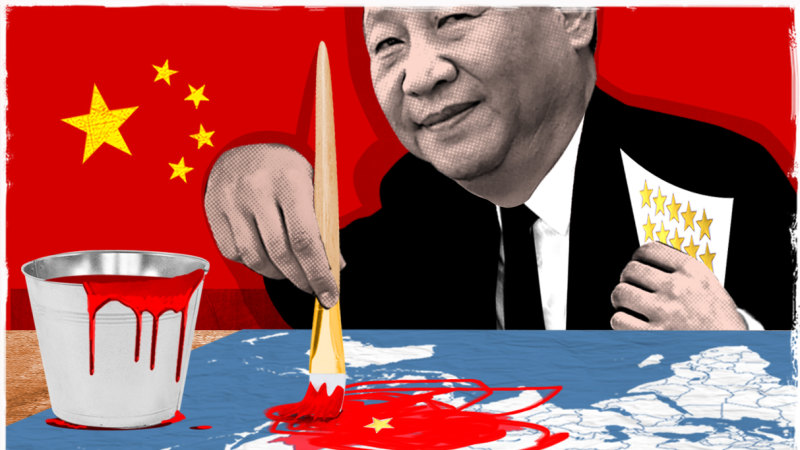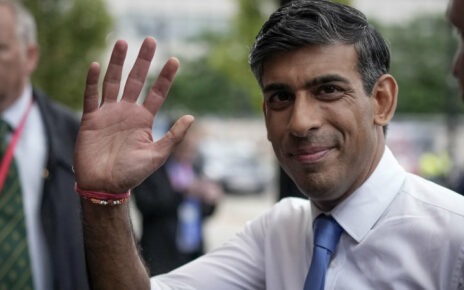Save articles for later
Add articles to your saved list and come back to them any time.
In a fit of imperial pique, China’s Xi Jinping has slammed the door on the Indo-Pacific region. By pulling out of the big annual summits this week in Indonesia and India, Xi shows he “has become deaf strategically and diplomatically in thinking that none of the other countries’ concerns matter,” says leading Indian strategic analyst C. Raja Mohan of the Institute of South Asian Studies at the University of Singapore.
Xi might have overlooked one awkward fact. The problem is that the region is not going away; China still lives in it. The Chinese president tried to assert power and influence over a dozen Indo-Pacific nations in the last fortnight. And failed, in three phases.
Illustration: Dionne. Credit:
First was the phase of the BRICS summit held in South Africa on August 22-24. BRICS is a loose association of developing nations. The acronym stands for Brazil, Russia, India, China and South Africa. Xi wants to use the grouping to extend China’s power in the world and to counter the West.
Xi had some success at last month’s summit as new members from South America, the Middle East and Africa signed up to join – Argentina, Egypt, Ethiopia, Iran, Saudi Arabia and the United Arab Emirates. But he had less success with the BRICS country central to the balance of power in the Indo-Pacific – India.
India, traditionally non-aligned, is a swing state in the confrontation between the US and China. It has been swinging towards the US ever since 2020 when Chinese troops clashed with India’s along their disputed border high in the Himalayas. Dozens died.
Xi used the occasion of the BRICS summit to woo his Indian counterpart: “He made an effort to fix the breach with India,” Mohan tells me. Xi proposed that the two neighbours set aside their border dispute and “let’s go back to normal,” as Mohan puts it.
Brazilian President Luiz Inacio Lula da Silva, Chinese President Xi Jinping, South African President Cyril Ramaphosa, Indian Prime Minister Narendra Modi and Russian Foreign Minister Sergei Lavrov at the BRICS summit in Johannesburg.Credit: Russian Foreign Ministry/Reuters
Indian Prime Minister Narendra Modi turned him down: “Modi said, ‘no – you have to walk back your aggression and only then can we go back to normal’,” says Mohan.
And it didn’t help Xi’s plans for Indo-Pacific dominance that Indonesia turned down an invitation to join the BRICS group. “We want to study the matter first, we don’t want to rush into it,” said Indonesian President Joko Widodo, known as Jokowi.
Indonesia, the dominant power of South-East Asia, has long been a key focus of Beijing’s efforts at seduction. Like India, Indonesia traditionally is non-aligned. And remains so. But China’s actions in the next two phases of its diplomatic ham-fistedness can only make Jakarta more inclined to reject its advances.
The second phase was the notorious “made-in-China map”. Beijing last week published its fantasy map of the South China Sea, the one that stamps China’s territorial ambitions all over its neighbours’ territory. Earlier versions showed a so-called “nine-dash line” marking Beijing’s claims. The new one has gained one extra to become a 10-dash line.
The claims aren’t new. But two factors made it especially inflammatory. First, Beijing called it the new “standard map”, meaning that it’s final and non-negotiable.
Remarks Mohan: “To make it in-your-face, putting it down as the standard map, is saying, ‘Look, there’s no room for compromise, it’s my way or the highway’. They are down the path of ‘we are simply claiming it, what’s your problem?’”
Half a dozen capitals denounced Xi’s map immediately. Vietnam, Malaysia and the Philippines dismissed it as having no basis under international law. And Indonesian Foreign Affairs Minister Retno Marsudi said “the drawing of any lines, any claims, must be in accordance with UNCLOS 1982”, the United Nations Convention on the Law of the Sea. Indonesia pointedly has changed its official name for the South China Sea to the North Natuna Sea.
All four of these nations are members of ASEAN. India, too, joined the chorus of aggrieved parties by lodging a strong protest with Beijing. And Taiwan, though recognised by most countries as part of China, nonetheless complained that “no matter how the Chinese government twists its position on Taiwan’s sovereignty, it cannot change the objective fact of our country’s existence”.
The other reason the map is so inflammatory is its timing, immediately before the big annual summits in Jakarta and Delhi, where Xi would be meeting face-to-face with the offended nations’ leaders.
Says Mohan: “To make this the core position of China, Xi is leaving himself little room and he’s pushing his neighbours toward the US. We have seen great leaders display great stupidity.”
The third phase is the decision by Xi, in apparent response to the regional outcry, to cancel his planned attendance at the summits, sending China’s Premier Li Qiang in his place.
The renowned sinologist Geremie Barme explains the sentiment behind this decision as “‘I’m not going to turn up, that’ll show ya!’”
“You will think, ‘that can’t be true’, but I’m sorry it is true. That’s the conundrum the world faces. China talks about being the world’s oldest civilisation and being superior, but it’s only 70 years old” in its current form as the People’s Republic “and it behaves like an adolescent. China is the man-child of Asia.”
Barme points to a best-selling 2016 book by Wu Zhihong, a Beijing-based psychologist, Giant Baby Nation: A Mainland Psychologist’s Systematic Examination of the Chinese National Character. Barme summarises it as “acting like a big baby and if you don’t get your way, you spit the dummy and act badly – there’s an element of that in Xi’s decision” to cancel his summit appearances.
He reminds us that the slogan emblazoned on the entrance to Zhongnanhai, the leadership compound where Xi lives and works, reads: “Long live the magnificent, glorious and infallible Chinese Communist Party”.
Mohan sees Xi moving into a new modus operandi, “using BRICS to build an anti-US platform and more directly confronting the West rather than coming to multilateral forums where you have to deal with contending views. It’s a big step.”
Peter Hartcher is international editor.
Most Viewed in World
From our partners
Source: Read Full Article





